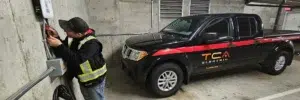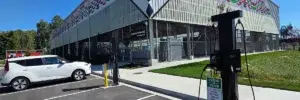With many Canadians well aware of the ongoing climate crisis, going green has become an increasingly important decision for property owners. Whether it’s building and furnishing with recycled materials or setting up a smart thermostat to audit energy use, there are more ways than ever for property owners to save energy and make sustainable choices. Beyond the home, nowhere is this environmentally friendly mindset more evident than with electric vehicles. According to The Globe and Mail, EV sales have been increasing annually, and the total number of electric vehicles on Canadian roadways has ballooned from 10,000 in 2014 to 136,000 as of October 2019. While electric vehicles are far from the majority, the bottom line is the number of electric cars on the road are only going to continue to grow in the 2020s.
Despite these advances, however, plenty of challenges remain when it comes to widespread adoption of electric vehicles. The vehicles can be pricey even after subsidies and tax breaks, and while EV charging is possible in many major cities, available stations aren’t always widespread. Luckily, homeowners and business owners alike have the option of installing ev charging stations to enable greater convenience in terms of charging options for their own electric vehicles and those of their residents, customers, and clients.
At TCA Electric, we’ve helped many in the Vancouver area more easily modernize with EV charging stations of all kinds—you might even say we’re EV charging experts. So in today’s post, we’ll go over some of the most important details of these devices, including how much electric vehicle charging stations cost, the kinds of charging stations available to residential and commercial building owners, and factors to weigh and discuss with your professional electrician before carrying out your EV charging project. In other words, we’ve got a lot to cover—so let’s get started!
Electric Vehicle Charging Stations: Cost and Savings
We’ll start with the first question on everyone’s mind: cost. While it’s hard to give a precise total figure, as this depends on what kind of charger you want, how many you’ll need, and any associated electrical upgrades, electric vehicle charging stations can cost a fair amount upfront. Whether it’s a Tesla home charger, a FLO charger, or anything else, you can expect to pay around $500-$1000 for the EV charging station, plus labour. Luckily, there have been many incentive programs in Canada and British Columbia over the years when it comes to electric vehicles, and many of these are continuing today as a means of encouraging consumers to switch from gas-powered to electric vehicles. BC Hydro has an excellent breakdown of EV incentives available in B.C. that you will likely find helpful.
Aside from incentives and rebates, though, it’s also important to weigh the savings and property value of these devices against the upfront cost of electric vehicle charging stations. For example, a recent bulletin from BC Hydro found that fueling an electric vehicle costs the equivalent of $0.25 per litre—and with gas prices hovering around $1.50 per litre in Vancouver, those savings add up quickly. In addition to savings, EV charging stations add value to both residential and commercial buildings. For homeowners, these devices are an important electrical upgrade to consider, depending on how soon you plan to sell.
What kinds of EV charging options are available?
While there are numerous brands and kinds of EV charging devices, for the most part the conversation breaks down to Level 1 vs. Level 2 chargers. While Level 3 chargers (or “superchargers”) do exist, these are less common for most property owners or organizations, though we’ll discuss them a bit later.
With a Level 1 charger, your electric vehicle can charge on pretty much any old three-pronged outlet. This makes Level 1 charging incredibly convenient, as you don’t need much in the way of additional equipment aside from the adapter itself. However, Level 1 charging, also called “trickle charging,” is the slowest option by far, as you only get about 4 kilometers of range for every hour of charging. This may work for shorter ranges—driving from home to work and back—but that’s about it.
Level 2 chargers, on the other hand, are much faster and are generally what people mean when they talk about installing a home charger. Where Level 1 EV charging operates with 120V outlets, Level 2 uses 240V, allowing for faster speeds. Per hour, Level 2 chargers can pull anywhere from 15-80 kilometers of range per hour of charging—a wide range, but dependent on numerous factors like the power output of your particular charger, the intake capabilities of your electric vehicle, and the maximum current capacity of your electrical panel.
Residential EV charging stations
For most single-family homes, a single EV charging station is plenty to keep up with demand. But which charger is right for your needs, and will your home require any additional electrical upgrades to make it happen? It all depends on your current situation—electrical current, that is.
As mentioned above, the maximum charging speed you can attain is, in part, dependent on your electrical panel. While many homes in the Vancouver area these days have a 200-amp panel, some still only have 100 amps of available power. This means that, for anything faster than Level 1 charging, you’ll need to upgrade your electrical panel. A 200-amp electrical panel, on the other hand, is generally sufficient for installing a Level 2 charger. However, one complicating factor is whether your residence in question has a secondary suite. If this is the case, it’s still possible to install an electric vehicle charger, but an additional device called a demand charge controller will also need to be added.
Overall, Level 1 chargers can work for those who don’t drive often, who only drive fairly close to home, or who prefer not to upgrade their electrical service. However, Level 2 chargers tend to be better all around. Level 2 EV charging stations can be more complicated to install, depending on your specific living situation, but whether you have a single-family home or a residence with a suite, there are available solutions to suit your EV charging needs. In general, most owners find the added cost of a Level 2 electric vehicle charging station to be worth the superior charging speed.
Commercial EV charging stations
For business owners and building managers, the question of EV charging generally comes to “how many” rather than “which charger.” This is because Level 1 chargers just don’t cut it in situations where a fleet of vehicles needs to be charged and ready to go at a moment’s notice, where employees will want their vehicles charged by the end of the workday, or where convenience is an important factor in attracting new tenants.
The number of chargers to be installed depends not just on the current number of electric vehicles among your employees and tenants, but also on how quickly you expect that number to grow. In general, for those in charge of commercial operations or larger residential buildings, a good rule of thumb is to expand your load capacity and install a number of chargers that stays well below this maximum. This allows you to maintain scalability without breaking the bank, while still adding a great deal of value for your business, your employees, or your tenants.
In a commercial setting, Level 3 chargers can also be an option. While their upfront cost is high, the investment may well be necessary if your business is one that requires frequent driving with little downtime during the day. Level 3 chargers can add 240+ kilometers of range in around 30 minutes, which is unbeatable. However, given the costs, it may be wiser to purchase a membership in an existing EV charger network that includes these high-power stations.
Available EV charging brands
There are countless EV charging options on the market today, but a handful of brands stick out to us as the ones we trust or get asked about the most as professional electricians.
Tesla
When it comes to electric vehicles, Tesla is almost synonymous with the technology for many folks. It only makes sense, then, that Tesla devices are a popular option for EV charging needs. The Tesla wall connector is well regarded in the industry, and their mobile connector makes for a reasonable backup option, enabling Tesla vehicle owners to plug in to ordinary outlets in a pinch. When you’ve decided on the right option for you, be sure to find an electrician experienced in and certified for Tesla charger installation. When installing a home charging station, it is important to consider that a Tesla charger can only charge a Tesla vehicle. While a Tesla can also be charged by a regular Level 2 charger, if you’re looking for more versatility, you may want to consider other EV charging brands.
FLO
A popular alternative to Tesla is a FLO charger. FLO is a Candian EV charging company with a fairly sizable (and growing) network of charging stations, the largest in Canada. While FLO offers home chargers (Flo Home G5 residential charger), the Core+ model is an especially good option for multi-unit residential complexes and commercial buildings. As with Tesla models, installing a FLO charger can only be done by an experienced electrician.
ChargePoint
For a more global charging option, ChargePoint currently has the largest network of EV charging stations in the world, and aims to offer 2.5 million stations worldwide by 2025. Meanwhile, ChargePoint home chargers such as the ChargePoint Home Flex are solid Level 2 options, and even include an app for scheduling charging hours using your mobile devices. For commercial operations, ChargePoint offers a variety of charging stations tailored to multi-family buildings and parking spaces, fleet charging, and everything in between.
TCA Electric: EV Charging Experts
There are many new green technologies on the market today, but electric vehicles might just be the one we’re most excited about here at TCA Electric. Because of that, our team makes sure to stay up to date on all the options available to commercial and residential customers alike. Whether you have a single-family home, a home with a secondary suite, or a high-capacity commercial operation that depends on a fleet of electric vehicles, we can work with you to provide the best EV charging solution for your needs. Contact TCA Electric today! We’re here to get your EV charging project moving right along.



